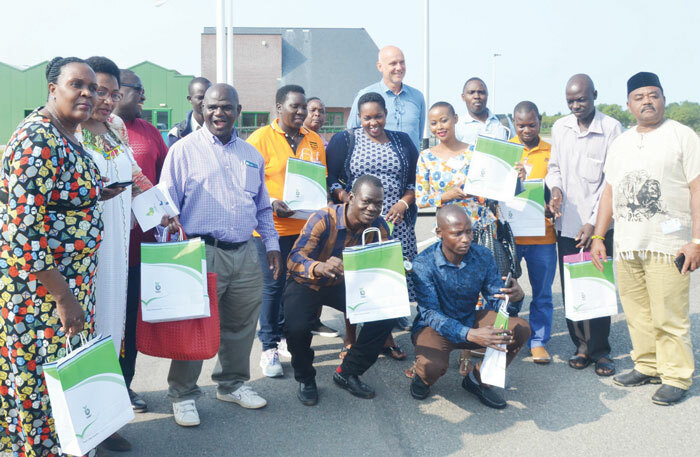Best farmers to be unveiled today
In total, 46 farmers have so far been awarded and have travelled to the Netherlands. The number will rise to 59 after today’s awards. Out of these, 17 are women.
AGRIBUSINESS
If the Best Farmers competition was a human being, today it would have passed the ‘deadly' and sensitive age of under five years old.
This is because the fifth group of winners will be announced today (Friday), at the Vision Group offices in Industrial Area, Kampala.
It always feels special when a child reaches their fifth birthday because then, they have outgrown the many diseases that attack children in their infancy. At five years, the child can also do so many things on their own, too.
Vision Group Chief Executive Officer (CEO) Robert Kabushenga says the idea of the best farmer's competition was ‘born' on a flight to Addis Ababa.
"I was on a flight when I had a chat with Victoria Sekitoleko, a former agriculture minister, about starting a competition for farmers," he says. Wonderful idea it was. In the next few weeks, the Embassy of the Netherlands, dfcu Bank ad KLM Airlines came on board.

Winners of the 2016 Best Farmers competition on a tour in the Netherlands
The competition was launched in December 2013 and the profiling of farmers started in January 2014. The Best Farmers competition is sponsored by the Embassy of the Netherlands, dfcu Bank, KLM Airlines, Koudjis Nutrition BV and Vision Group. "This is one of the best ideas to have come up and implemented in the last five years.
It has totally changed the face of agriculture in many ways," Victoria Sekitoleko, who is also the chief judge, says. Fifty-nine awarded This is the fifth group of farmers to be announced since the competition started in 2014.
In total, 46 farmers have so far been awarded and have travelled to the Netherlands. The number will rise to 59 after today's awards. Out of these, 17 are women. A breakdown of the overall winners in the last four years shows that the first came from the central region, the second came from the north, the third came from the west and the fourth came from the east.
Where will the fifth come from?
This will be answered today.
The awards
The top 10 farmers share sh150m, awarded by dfcu Bank. They also win a sponsored study tour of the Netherlands which is the second largest exporter of agricultural produce in the world.
Visiting the country offers the best farmers a chance to learn value addition processes, proper management systems and agriculture co-operation. "There is a positive change in farming practices among the previous winners who visited the Netherlands. Some have adopted new technologies they learnt from the tour.
Others have even paid for themselves to go back to Netherlands," says Josephat Byaruhanga, one of the judges, who also co-ordinates the competition at the Embassy of the Netherlands. Out of the top 10, the best three have access to a sh100m asset acquisition prize of which the winner gets sh50m, first and second runner-up share sh30m and sh20m, respectively.
The other seven farmers share sh50m, which comes up to sh7.1m each. This means that after today's awards, a total of sh750m have been awarded in the last five years. Farmers like Abdullah Mandalji (the 2016 competition winner) used the sh50m to buy a processing unit for cereals. Dr. Tony Kidega (winner of 2015 competition) used the sh50m to buy a tractor, just like Nicholas Matsiko, also a 2015 winner.
|
The Government must support vet officers to establish themselves as businesses, if this is to be minimise losses. Most farmers do not have proper storage facilities for their produce. At least 40% of the produce is wasted during harvest. Farmers should build storage cribs on one hand, while on the other, the Government should construct produce storage facilities at every district.
|
Others have acquired irrigation equipment, greenhouses and hand-operated tractors, etc. Special categories "We have also had two special categories so far, with the third coming with the 2018 awards," Byaruhanga says.
The first special category came in the 2015 competition and it focused on youth. The second special category in 2016 targeted women farmers. "This was because the number of women engaged in commercial agriculture is still low. This category was intended to encourage more of them to join farming," Sekitoleko says.
While in 2014 winners there were three women in the top 10, the 2015 group had only Diana Nsubuga Nambatya. This is why the 2016 competition had a special category for women. So, in 2016, the group had a total of six women winners. These included three women in the main category and three women under the special category.
Observations of the judges over the years While the general consensus by the best farmers' judges is that agriculture is still the backbone of Uganda's economy, they have through the years pointed out several challenges that are impeding Ugandan farmers from reaching their full potential.
Many of the challenges were identified by the farmers who have been featured in the competition. According to the judges, the challenges include those orchestrated by farmers and those which stem from the failure by policy implementers to do certain things.